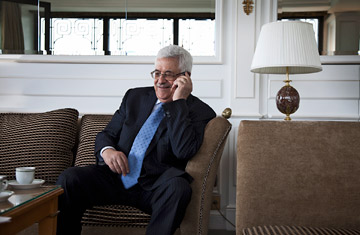
(2 of 6)
The ICC is an uncomfortable issue for Israel, which voted against its creation in part because the court's founding statute suggested that it would regard the establishment of West Bank settlements as a war crime. Individual Israeli officials could also face charges if Palestinians found both grounds and the political will to proceed. "I think the whole statehood agenda is in a way geared toward embarrassing Israel in international forums such as the ICC, especially in the area of settlements, where Israel doesn't have good legal answers," says Yuval Shany, dean of Hebrew University's law school. "The ICC is a big issue."
What's more, nonmember-observer-state status can be bestowed by a simple majority vote of the General Assembly, thus avoiding the Security Council and the threat of a U.S. veto that torpedoed last year's bid for full member status. This time, the Palestinians had what Abu Mazen could have had a year ago: a clear path to leverage their greatest asset--international sympathy--in hopes of leveling a playing field that has become badly tilted because of Israel's military, economic and diplomatic advantages.
This year's U.N. appearance also highlighted what stands as the signal accomplishment of Abbas, for all his many stumbles: the movement of the world's most chronicled conflict from a low-intensity asymmetrical war--street fights laced with terror--to where we find it today, in the bloodless realm of diplomacy. In the five years before Abbas became Palestinian President, more than 5,000 Palestinians and 1,000 Israelis were killed. In the past three years, the numbers were 311 and 20.
Not that Abu Mazen is getting much credit from either side for such efforts. While Israelis may now board buses and sip lattes in cafs all but free from the threat of suicide bombers, Palestinians complain of seeing no reward for showing the restraint that Abbas vowed would put an end to the Israeli occupation through negotiations. And as Abbas prepared to return to New York City last month, Israel's right-wing Foreign Minister, Avigdor Lieberman, called Abbas a "diplomatic terrorist," an Orwellian insult if ever there was one. "He would be the ideal leader--avuncular, grandfatherly, a modern man, free from violence--to head a Palestinian state if one already existed," says Aaron David Miller, a former U.S. negotiator under three Presidents. "Unfortunately, charm and persuasion are not sufficient to bail him out of the fix he's in."
It's a bad fix. Abbas' decision to apply for full statehood at the U.N. last year set in motion forces that threaten to bring down his life's work. At risk are the Oslo Accords of 1993 and 1995 that laid out the principles at the heart of the world's hoped-for solution to the Israeli-Palestinian conflict: the establishment of two states for two peoples. Abbas' 2011 U.N. bid so irked Israel and Washington that each held back vital funding to Abbas' Palestinian National Authority (PA), the Palestinian transitional government. The revenue shortfalls wreaked havoc on the Palestinian economy. By September, people were burning tires in the streets to protest not Israel's 45-year military occupation but the PA itself.
The uproar left Abbas with even less room to maneuver. "His weapon is only negotiations," says Abdul Jawad Saleh, a former PA Minister. "He doesn't know how to confront."
